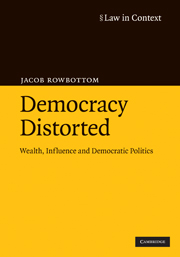Book contents
- Frontmatter
- Contents
- Preface and acknowledgements
- 1 Political equality, wealth and democracy
- 2 Freedom to speak and freedom to spend
- 3 Strategies and reforms
- 4 Access, influence and lobbying
- 5 Beyond equal votes: election campaigns and political parties
- 6 Public spaces, property and participation
- 7 The mass media: democratic dreams and private propagandists
- 8 Participation in the digital era: a new distribution?
- 9 Conclusion
- Index
- References
2 - Freedom to speak and freedom to spend
Published online by Cambridge University Press: 05 June 2012
- Frontmatter
- Contents
- Preface and acknowledgements
- 1 Political equality, wealth and democracy
- 2 Freedom to speak and freedom to spend
- 3 Strategies and reforms
- 4 Access, influence and lobbying
- 5 Beyond equal votes: election campaigns and political parties
- 6 Public spaces, property and participation
- 7 The mass media: democratic dreams and private propagandists
- 8 Participation in the digital era: a new distribution?
- 9 Conclusion
- Index
- References
Summary
Political equality has a close connection with the freedom to speak and to associate. Participation in a democracy requires that people are free to engage in political activities, such as debating, protesting and forming associations. Such freedoms are also necessary to ensure people remain well-informed and can hold government to account. A central objection to censorship is that to silence a person is to treat him unequally and to deny him a say. The political freedoms and equality therefore complement one another as central components in the democratic system. Steps to promote political equality that give people the means to participate can also serve those political freedoms. For example, some subsidies for expressive activities can give more people a real opportunity to exercise the freedom to speak.
Political freedoms and political equality can, however, come into tension with one another. Two people can be made equal not just by improving the position of the disadvantaged, but also by curtailing that of the advantaged. Those attempts to promote political equality that seek to restrict the way people can spend their money or use their property are sometimes criticised for infringing political freedoms. These arguments can arise where laws limit the amount that can be spent in an election campaign, grant a person access to another's property, or require the mass media to be impartial or inclusive. This line of criticism highlights the impact of egalitarian measures on the expression of a person who wants to use his wealth for political purposes.
- Type
- Chapter
- Information
- Democracy DistortedWealth, Influence and Democratic Politics, pp. 33 - 61Publisher: Cambridge University PressPrint publication year: 2010

